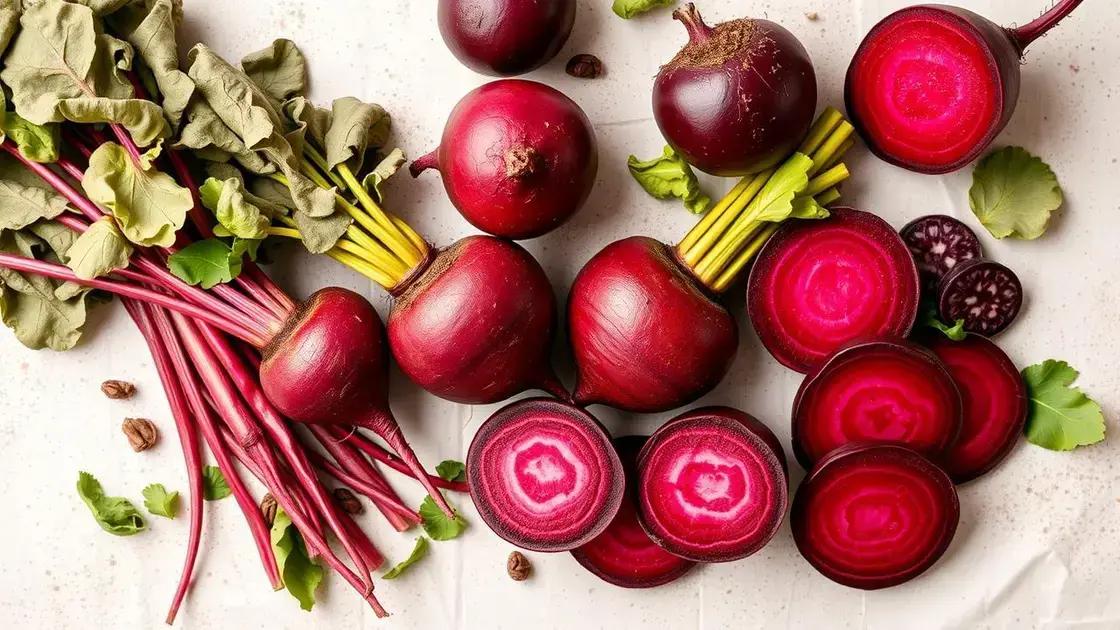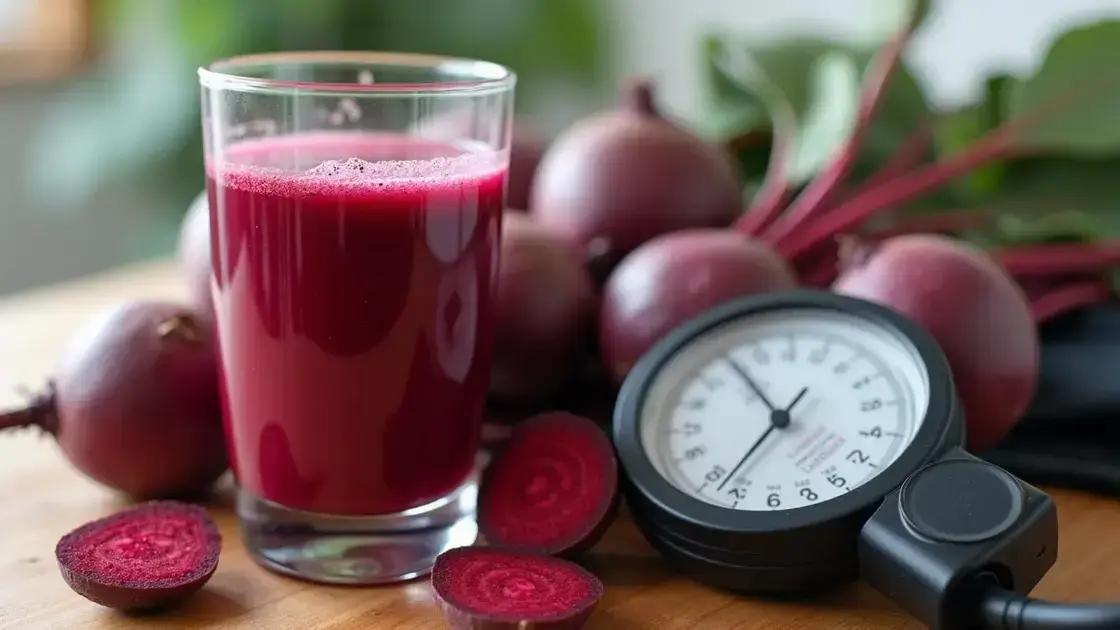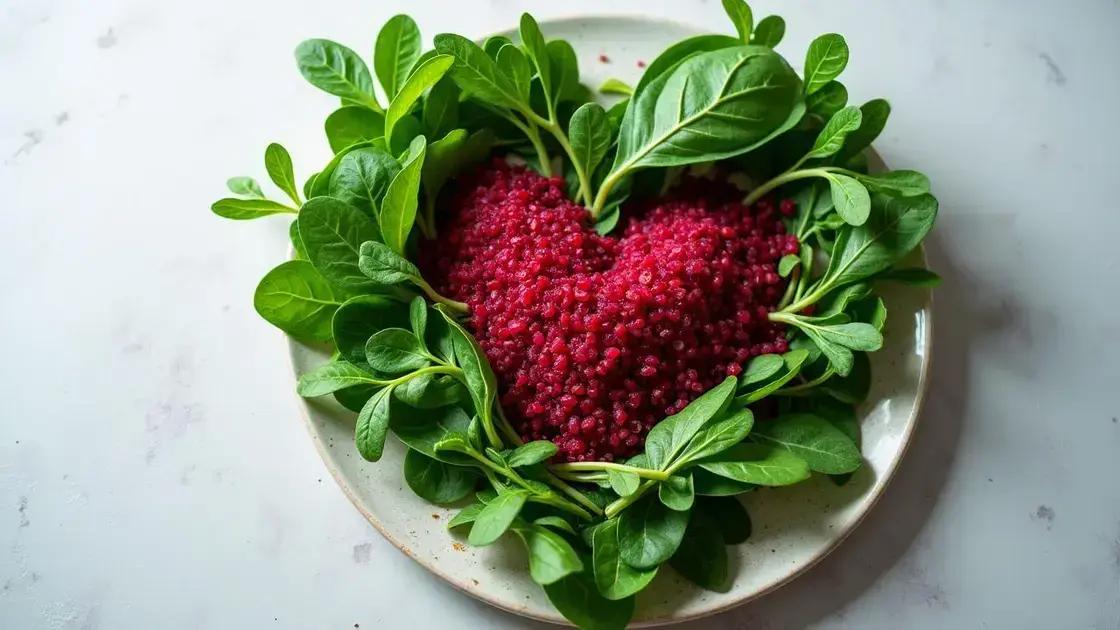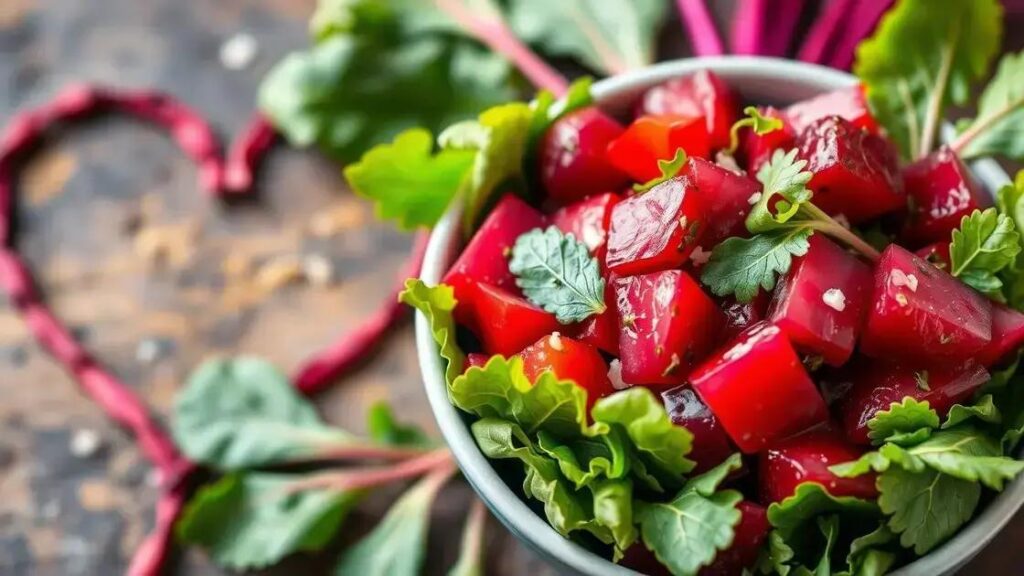The benefits of beetroot for cardiovascular health include its high nitrate content, which helps lower blood pressure, improve circulation, and support overall heart health, making it a valuable addition to a heart-healthy diet.
Beetroot, a vibrant red vegetable, is gaining attention for its incredible benefits for cardiovascular health. Rich in essential nutrients and nitrates, beetroot plays a significant role in improving blood flow, lowering blood pressure, and enhancing overall heart health. In this article, we will explore the nutritional value of beetroot, how it affects blood pressure, the role of nitrates in supporting heart functions, and simple ways to enjoy this superfood in your daily meals.
What is Beetroot and Its Nutritional Value?

Beetroot, also known as beet, is a root vegetable famous for its vibrant color and numerous health benefits. It belongs to the Amaranthaceae family, and its scientific name is Beta vulgaris. This vegetable is packed with essential nutrients, vitamins, and minerals that contribute to overall health.
Nutritional Value of Beetroot
Beetroot is low in calories but rich in important nutrients. A typical serving of boiled beetroot (about 100 grams) contains:
- Calories: 43
- Protein: 1.6 grams
- Carbohydrates: 9.6 grams
- Dietary Fiber: 2.3 grams
- Folate: 109 micrograms (27% of the Daily Value)
- Vitamin C: 4 mg (7% of the Daily Value)
- Potassium: 305 mg (9% of the Daily Value)
- Manganese: 0.3 mg (15% of the Daily Value)
Health Benefits of Nutrients in Beetroot
Beetroot’s benefits for cardiovascular health primarily come from its high levels of nitrates. These nitrates convert to nitric oxide in the body, which can help relax blood vessels, improving circulation and lowering blood pressure.
Rich in Antioxidants
Moreover, beetroot contains several antioxidants like betalains, which can reduce inflammation and oxidative stress, further supporting heart health. These compounds help protect cells and improve overall health.
How Beetroot Affects Blood Pressure

Beetroot has a significant impact on blood pressure due to its high nitrate content. When consumed, dietary nitrates convert to nitric oxide in the body. This molecule plays a vital role in relaxing and widening blood vessels, which improves blood flow.
How Nitrates Lower Blood Pressure
The process begins when you eat beetroot or drink beetroot juice. Once ingested, nitrates are converted to nitrites by bacteria in the mouth. These nitrites then convert to nitric oxide in the stomach and bloodstream. Research shows that this process can lead to a significant decrease in blood pressure levels.
Studies on Beetroot and Blood Pressure
Several studies demonstrate that beetroot juice can effectively lower blood pressure. In one study, participants who consumed beetroot juice experienced an average reduction of 4-10 mmHg in systolic blood pressure within just a few hours. This effect can last for many hours, making beetroot an excellent addition to a heart-healthy diet.
Importance of Dietary Nitrates
In addition to beetroot, other leafy greens and vegetables also contain dietary nitrates. Incorporating a variety of these foods can help maintain healthy blood pressure levels. However, the unique combination of vitamins, minerals, and antioxidants in beetroot provides extra heart health benefits beyond just nitrates.
The Role of Nitrates in Heart Health

Nitrates are naturally occurring compounds found in many vegetables, particularly in beetroot. They play a key role in maintaining heart health by improving circulation and reducing blood pressure.
How Nitrates Work
When consumed, dietary nitrates are converted into nitric oxide in the body. This molecule helps relax blood vessels, leading to better blood flow. Improved circulation can reduce the risk of heart-related issues such as hypertension and atherosclerosis.
Benefits of Nitric Oxide
Nitric oxide has several benefits for heart health:
- It helps improve oxygen delivery to muscles and organs.
- It can enhance exercise performance and stamina.
- It decreases the workload on the heart.
- It may reduce inflammation in blood vessels.
Sources of Nitrates
While beetroot is a rich source of nitrates, other foods like spinach, arugula, and celery also contain significant amounts. By including these foods in your diet, you can naturally boost your nitrate intake, supporting overall cardiovascular health.
Incorporating Beetroot into Your Diet

Incorporating beetroot into your diet is simple and delicious. This vibrant vegetable can be enjoyed in various forms, making it easy to add to meals and snacks.
Ways to Enjoy Beetroot
Here are some popular ways to include beetroot in your meals:
- Juicing: Freshly squeezed beetroot juice is a refreshing drink. You can mix it with other fruits and vegetables for added flavor and nutrients.
- Salads: Add roasted or raw beetroot to salads. They pair well with greens, nuts, and crumbled cheese for a tasty, nutritious meal.
- Soups: Beetroot can be the base for delicious soups like borscht, which is a traditional beet soup popular in Eastern Europe.
- Smoothies: Blend beetroot into your favorite smoothies. It adds a beautiful color and boosts the nutritional profile.
- Side Dishes: Roasted beetroot can be served as a side dish. It can be seasoned with olive oil, salt, and pepper for a simple yet flavorful option.
Tips for Cooking Beetroot
When preparing beetroot, remember:
- Wear gloves while handling to avoid staining your hands.
- Roasting brings out the natural sweetness of beetroot.
- Don’t discard the greens! Beet greens are edible and can be sautéed or added to salads.
Embrace the Heart-Healthy Benefits of Beetroot
Incorporating beetroot into your diet is an effective way to support cardiovascular health. Rich in essential nutrients and nitrates, beetroot can help lower blood pressure and improve blood flow.
With a variety of delicious ways to enjoy this vegetable, from juices and salads to roasted dishes, adding beetroot to your meals is both easy and rewarding.
As you explore the benefits of beetroot, remember that a balanced diet rich in fruits, vegetables, and whole grains is key to maintaining a healthy heart. So, take advantage of this vibrant superfood and let it contribute to your overall well-being!
FAQ – Frequently Asked Questions About Beetroot and Heart Health
What are the health benefits of beetroot?
Beetroot is high in nitrates, antioxidants, and essential nutrients, which can help lower blood pressure, improve circulation, and support overall heart health.
How can I incorporate beetroot into my diet?
You can enjoy beetroot in many ways, including juices, salads, soups, smoothies, and roasted as a side dish.
How do nitrates in beetroot affect blood pressure?
Nitrates convert to nitric oxide in the body, which helps relax and widen blood vessels, improving blood flow and lowering blood pressure.
Are there any side effects of eating beetroot?
Beetroot is generally safe for most people. However, excessive consumption may lead to darker urine or stools, a condition known as beeturia.
Can I consume beetroot juice daily?
Many people can safely consume beetroot juice daily, but it’s best to start with smaller amounts and consult a healthcare provider if you have concerns.
What other foods are high in nitrates?
Other leafy greens, such as spinach and arugula, as well as celery and radishes, are also rich in nitrates and beneficial for heart health.













